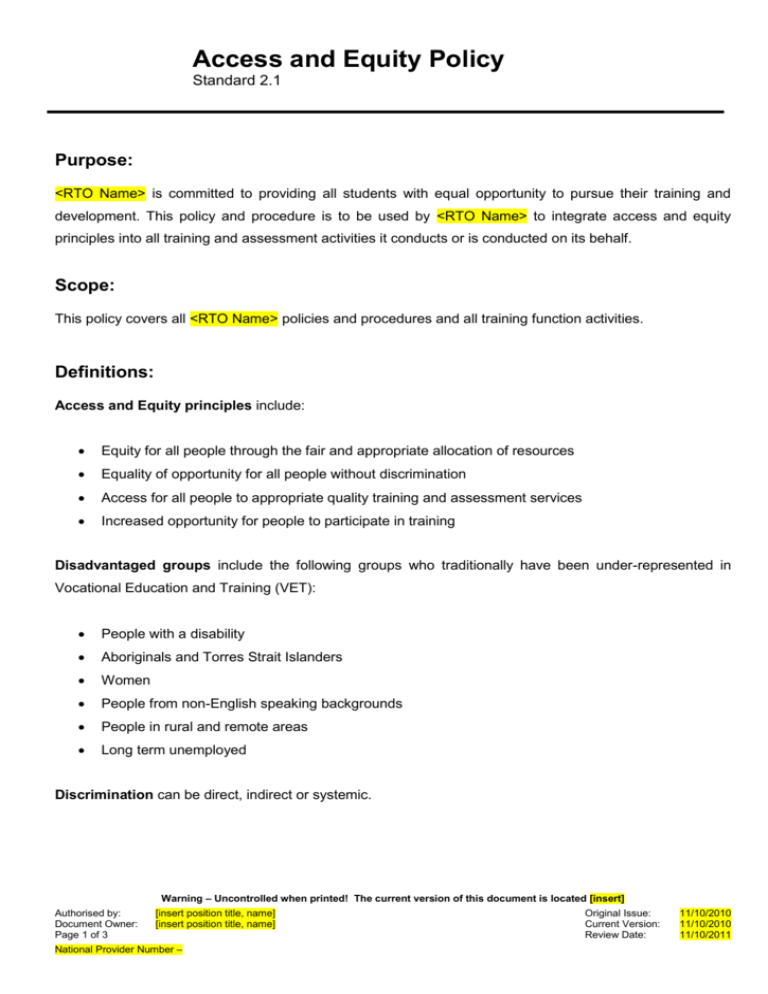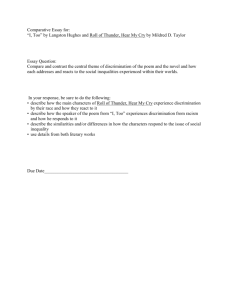
Access and Equity Policy
Standard 2.1
Purpose:
<RTO Name> is committed to providing all students with equal opportunity to pursue their training and
development. This policy and procedure is to be used by <RTO Name> to integrate access and equity
principles into all training and assessment activities it conducts or is conducted on its behalf.
Scope:
This policy covers all <RTO Name> policies and procedures and all training function activities.
Definitions:
Access and Equity principles include:
Equity for all people through the fair and appropriate allocation of resources
Equality of opportunity for all people without discrimination
Access for all people to appropriate quality training and assessment services
Increased opportunity for people to participate in training
Disadvantaged groups include the following groups who traditionally have been under-represented in
Vocational Education and Training (VET):
People with a disability
Aboriginals and Torres Strait Islanders
Women
People from non-English speaking backgrounds
People in rural and remote areas
Long term unemployed
Discrimination can be direct, indirect or systemic.
Warning – Uncontrolled when printed! The current version of this document is located [insert]
Authorised by:
Document Owner:
Page 1 of 3
[insert position title, name]
[insert position title, name]
National Provider Number –
Original Issue:
Current Version:
Review Date:
11/10/2010
11/10/2010
11/10/2011
Access and Equity Policy
Standard 2.1
Direct discrimination
Direct discrimination is any action which specifically excludes a person or group of people
from a benefit or opportunity, or significantly reduces their chances of obtaining it, because
their status or personal characteristics, irrelevant to the situation (eg, sex, ethnic origin) are
applied as a barrier. Direct discrimination has as a focus assumed differences between
people.
Indirect discrimination
Indirect discrimination is the outcome of rules, practices and decisions which treat people
equally and therefore appear to be neutral; but which, in fact, perpetuate an initially unequal
situation and therefore significantly reduce a person's chances of obtaining or retaining a
benefit or opportunity. Rules, practices and decisions are applied to all groups alike but it is
the very assumption of a likeness that constitutes the discrimination.
Systemic discrimination
A system of discrimination perpetuated by rules, practices and decisions which are realised
in actions that are discriminatory and disadvantage a group of people because of their status
or characteristics and serve to advantage others of different status or characteristics. Direct
and indirect discrimination contribute to systemic discrimination.
Equity focuses on outcomes. Equity is not concerned with treating people in the same way; it is concerned
with ensuring that all groups of people participate and benefit to the same level.
Legislation includes
Commonwealth Racial Discrimination Act 1975
Commonwealth Sex Discrimination Act 1984
Commonwealth Disability Discrimination Act 1992
Commonwealth Racial Hatred Act 1995
Disability Services Act 2006
Warning – Uncontrolled when printed! The current version of this document is located [insert]
Authorised by:
Document Owner:
Page 2 of 3
[insert position title, name]
[insert position, name]
National Provider Number –
Original Issue:
Current Version:
Review Date:
01/10/2010
01/10/2010
01/10/2011
Access and Equity Policy
Standard 2.1
Sexual harassment is defined by the Commonwealth Sexual Discrimination Act 1984 as when a person:
makes an unwelcome sexual advance or an unwelcome request for sexual favours;
Engages in unwelcome conduct of a sexual nature, and a reasonable person would have
anticipated that the person harassed would be offended, humiliated or intimidated.
POLICY
1. The aim of the policy is to remove barriers and to open up developmental opportunities for all students
by creating a workplace and training environment that are free from discrimination, harassment, bigotry,
prejudice, racism and offensive behaviour.
2. All students will receive fair and equitable treatment in all aspects of training and employment without
regard to political affiliation, race, colour, religion, national origin, sex, marital status or physical
disability.
3. A person with a disability may be excluded under this policy if the disability could cause occupational
health and safety risks to the person and/or other students.
4. All trainers / assessors are responsible to observe and be advocates for the policy.
5. This policy will be widely disseminated in the organisation.
6. <RTO Name>'s policies and procedures will be monitored and reviewed to ensure that they recognise
and incorporate the rights of individuals.
<RTO Name>’s <Position> will be the person responsible for the implementation and maintenance of
the policy.
Warning – Uncontrolled when printed! The current version of this document is located [insert]
Authorised by:
Document Owner:
Page 3 of 3
[insert position title, name]
[insert position, name]
National Provider Number –
Original Issue:
Current Version:
Review Date:
01/10/2010
01/10/2010
01/10/2011







